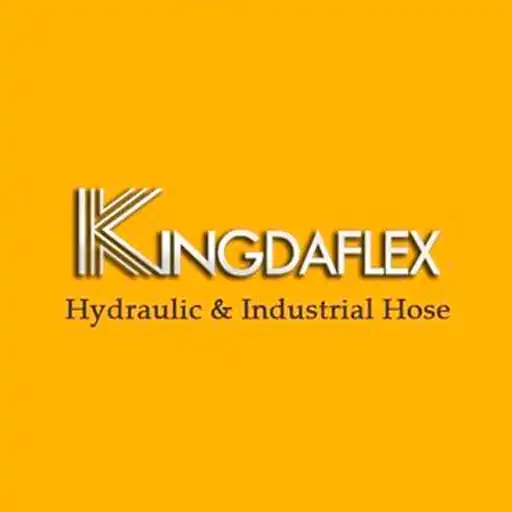Hydraulic hoses play a crucial role in various industries, transferring fluid power to enable machinery and equipment to function seamlessly. However, the disposal of these hoses is a topic often overlooked but of immense environmental significance.
In this article, we delve into the environmental impact of improper hydraulic hose disposal, current practices, the need for sustainable solutions, and how individuals and industries can contribute to responsible disposal.
Why Proper Hydraulic Hose Disposal is Important
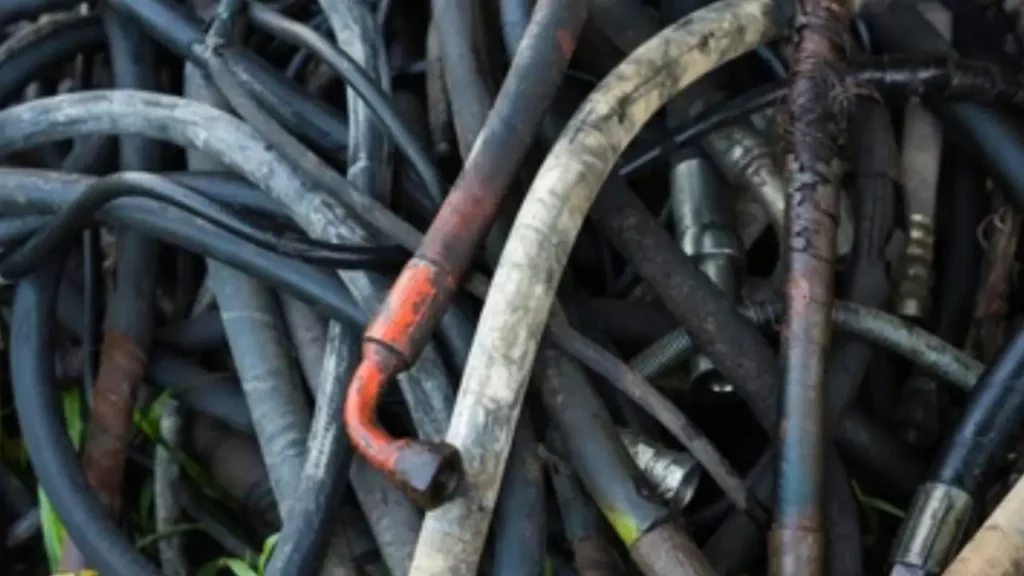
Hydraulic hoses can be safely disposed of in regular household trash. False
Hydraulic hoses contain various components that can harm the environment if not disposed of properly:
- Hydraulic Fluid: Many hydraulic fluids contain harmful chemicals that can contaminate soil and water.
- Rubber and Synthetic Materials: These materials can take a long time to decompose in landfills, contributing to environmental pollution.
- Metal Fittings: These can contain heavy metals that can leach into the environment and cause harm to wildlife.
- Recycling: Many companies specialize in recycling hydraulic hoses, recovering valuable materials like rubber and metal.
- Hazardous Waste Disposal: If the hose contains significant amounts of hydraulic fluid, it may need to be disposed of as hazardous waste.
- Local Regulations: Always check with your local waste management authority for specific guidelines on hydraulic hose disposal in your area.
Proper disposal of hydraulic hoses is essential for environmental protection. True
Hydraulic hoses contain various materials, including rubber, steel, and potentially hazardous fluids. Improper disposal can have significant environmental consequences:
- Fluid Contamination: Leaking hydraulic fluids can contaminate soil and waterways, harming wildlife and polluting water sources.
- Microplastic Pollution: Rubber components can degrade into microplastics, which can enter the environment and harm ecosystems.
- Metal Pollution: Steel components can leach heavy metals into the environment if not disposed of properly.
Proper hydraulic hose disposal is crucial for several reasons:
Environmental Protection:
- Pollution Prevention: Hydraulic hoses contain materials like rubber, steel, and potentially hazardous fluids. Improper disposal, such as dumping in landfills or burning, can release these substances into the environment, contaminating soil and water.
- Resource Conservation: Many components of hydraulic hoses, like steel and rubber, can be recycled, conserving natural resources and reducing the demand for raw materials.
Health and Safety:
- Hazardous Materials: Hydraulic fluids can be toxic or flammable. Improper disposal can expose workers and the public to these hazards.
- Fire Risk: Burning hydraulic hoses can release toxic fumes and contribute to air pollution.
- Compliance:
Regulations: Many regions have regulations governing the disposal of hazardous waste, including hydraulic hoses. Non-compliance can result in fines and penalties.
Corporate Social Responsibility:
Sustainability: Proper disposal demonstrates a commitment to environmental responsibility and sustainability, enhancing a company’s image.
Proper Disposal Methods:
- Recycling: Many companies offer recycling programs for hydraulic hoses.
- Specialized Disposal Facilities: Utilize licensed waste disposal facilities that can handle hazardous materials safely.
- Manufacturer Take-Back Programs: Some manufacturers have programs to take back their used hoses for proper recycling.
By prioritizing proper disposal, businesses can minimize environmental impact, protect human health, and ensure compliance with relevant regulations.
Environmental Impact of Improper Disposal Hydraulic Hose
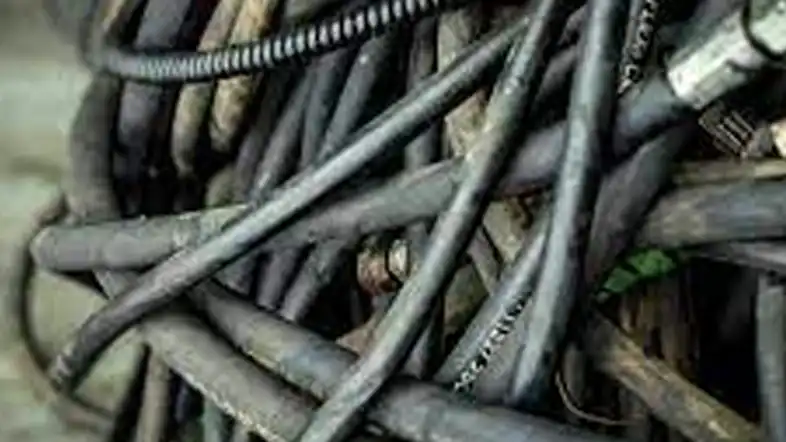
The environmental impact of improper disposal of hydraulic hoses is a grave concern that extends beyond mere waste management. When hydraulic hoses are not disposed of properly, they pose a significant threat to the delicate balance of ecosystems and the overall health of the environment.
One of the primary issues stems from the potential contamination of soil and water sources. Hydraulic hoses often contain remnants of hydraulic fluids, lubricants, and other substances used in industrial processes. When these hoses are discarded inappropriately, these residual materials can leach into the soil, causing pollution. The contaminated soil, in turn, can negatively affect the growth of plants and disrupt the natural composition of the ecosystem.
Moreover, improper disposal can lead to the seepage of contaminants into water bodies, further exacerbating the environmental impact. The chemicals and substances present in hydraulic hoses can contaminate rivers, lakes, and groundwater, posing a direct threat to aquatic life. Fish and other aquatic organisms may suffer from the adverse effects of these pollutants, disrupting the entire aquatic ecosystem.
The consequences are not limited to aquatic environments alone; the impact extends to terrestrial ecosystems as well. Soil and water contamination can have a cascading effect on wildlife, affecting the animals that rely on these resources for sustenance. This disruption in the food chain can lead to long-lasting ecological imbalances.
Signs to Dispose of Hydraulic Hose
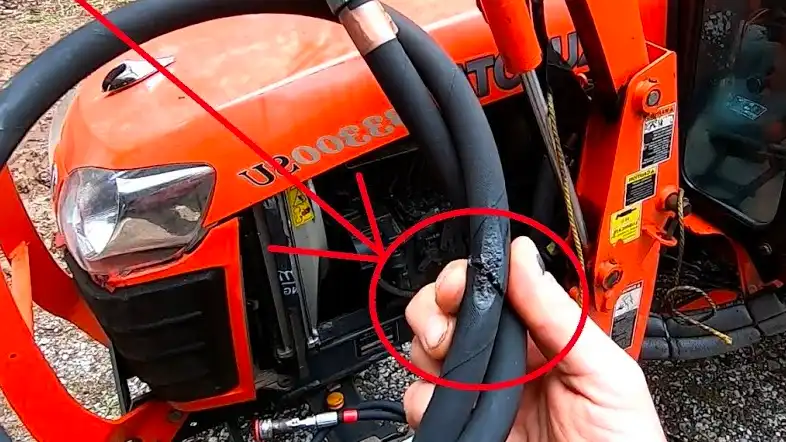
Knowing when to dispose of a hydraulic hose is crucial to ensure the safety and efficiency of hydraulic systems.
Here are signs that indicate it may be time to dispose of a hydraulic hose:
Visible Damage:
Sign: Obvious cuts, abrasions, or punctures on the hose.
Reason: Visible damage weakens the structural integrity of the hose, making it susceptible to leaks or failure.
Bulges or Swelling:
Sign: Bulging or swelling along the length of the hose.
Reason: Indicates potential internal damage or degradation of the hose, increasing the risk of rupture.
Leakage:
Sign: Visible hydraulic fluid leakage.
Reason: Leakage suggests compromised hose integrity, leading to potential system failure and loss of hydraulic fluid. Hydraulic hose leaking problems are extremely serious for the hydraulic system safety.
Corrosion:
Sign: Rust or corrosion on the hose fittings or outer surface.
Reason: Corrosion weakens the hose material, reducing its ability to withstand pressure and increasing the likelihood of failure.
Age and Service Life:
Sign: The hose has surpassed its recommended service life.
Reason: Over time, hoses degrade due to environmental factors and usage. Manufacturers often provide guidelines on the expected service life.
Frequent Repairs:
Sign: Regular repairs or hydraulic hose maintenance on the same hose.
Reason: Repeated repairs indicate ongoing issues and may suggest that the hose is reaching the end of its usable life.
Loss of Flexibility:
Sign: Stiffness or loss of flexibility in the hose.
Reason: Reduced flexibility indicates material fatigue, making the hose more prone to cracking or failure.
Unusual Sounds:
Sign: Unusual noises, such as whining or hissing, during hydraulic system operation.
Reason: These noises may indicate fluid leaks or pressure irregularities caused by a compromised hose.
Inadequate Performance:
Sign: Decreased efficiency or performance of the hydraulic system.
Reason: A failing hose can impact the overall functionality of the hydraulic system, leading to reduced performance.
Exposure to Extreme Conditions:
Sign: Prolonged exposure to extreme temperatures, chemicals, or harsh environmental conditions.
Reason: Such exposures can accelerate hose degradation, making it susceptible to failure.
Manufacturer’s Recommendations:
Sign: The hydraulic hose manufacturer recommends replacement at specific intervals.
Reason: Manufacturers provide guidelines for replacement based on factors such as usage, environmental conditions, and material characteristics.
Visible Signs of Wear:
Sign: Wear and tear evident on hose covers or reinforcement layers.
Reason: Visible wear indicates material fatigue and can compromise the hose’s ability to withstand pressure.
Fluid Discoloration:
Sign: Discoloration of hydraulic fluid.
Reason: Contaminants from a deteriorating hose can lead to fluid discoloration, signaling potential issues.
Regular inspections, adherence to manufacturer recommendations, and prompt replacement when signs of wear or damage are evident are essential practices to maintain hydraulic system integrity and prevent potential hazards.
Options for Disposing Hydraulic Hoses
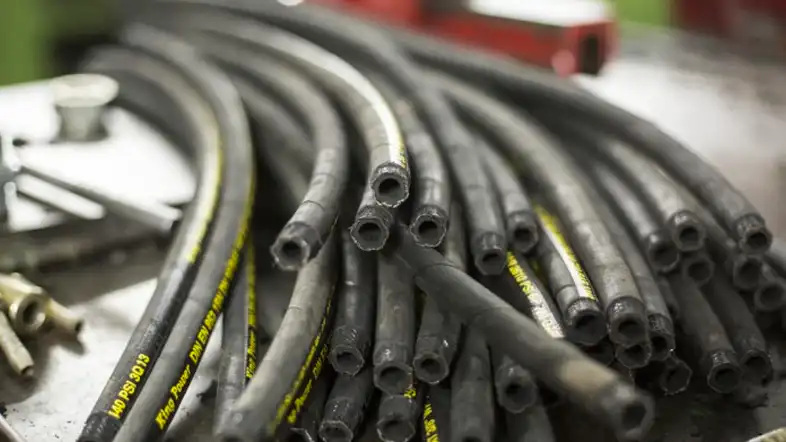
When it comes to disposing of hydraulic hoses, several options exist, each with its own set of considerations. The choice of disposal method depends on factors such as the type of hose, its condition, and the materials used in its construction. Here are some common options for disposing of hydraulic hoses:
Recycling Centers:
Recycling is an environmentally responsible option. Many recycling centers accept hydraulic hoses and can process them to reclaim materials. However, it’s essential to check with the recycling facility to ensure they can handle hydraulic hoses due to their diverse construction.
Manufacturer Take-Back Programs:
Some hydraulic hose manufacturers offer take-back programs where they collect used hoses for recycling or proper disposal. Check with the manufacturer of the hose to see if such a program is available.
Local Waste Disposal Facilities:
Many municipal waste disposal facilities accept hydraulic hoses. However, it’s crucial to inquire about their specific guidelines for disposal. Some facilities may require the hoses to be cut into smaller pieces or follow other specific procedures.
Reuse or Repurpose:
In cases where hoses are still in good condition, consider reusing or repurposing them for non-critical applications. This option reduces waste and extends the lifespan of the hose.
Landfill Disposal:
While not the most environmentally friendly option, some hydraulic hoses may end up in landfills. This should be a last resort, as it contributes to the accumulation of non-biodegradable waste.
Professional Disposal Services:
Some companies specialize in the disposal of industrial materials, including hydraulic hoses. They ensure proper disposal according to environmental regulations and may offer a convenient solution for businesses with large quantities of hoses.
Donations to Educational Institutions:
In cases where hoses are still functional but no longer suitable for industrial use, educational institutions, especially those with engineering or mechanics programs, may welcome donations for educational purposes.
DIY Disposal:
Individuals may attempt to cut and dispose of hydraulic hoses themselves. However, it’s crucial to follow safety guidelines, wear protective gear, and adhere to local regulations to ensure proper disposal.
Before choosing a disposal option, it’s essential to research and understand local regulations regarding the disposal of industrial materials. Responsible disposal not only minimizes environmental impact but also contributes to a sustainable approach to waste management.
Need for Sustainable Hydraulic Hoses
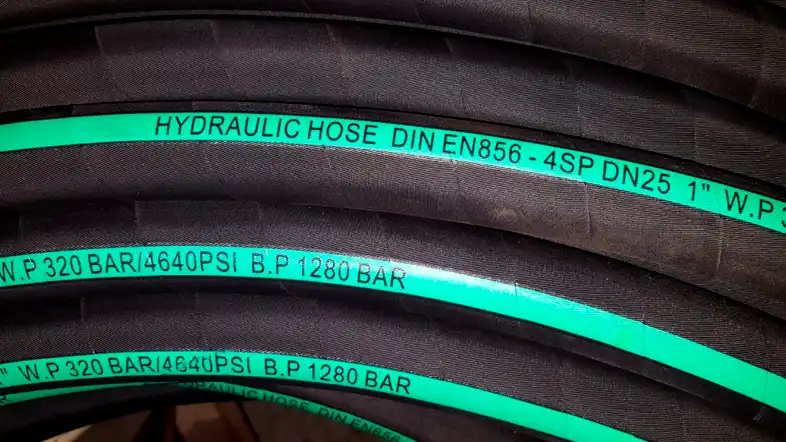
The need for sustainable hydraulic hoses has become increasingly imperative in the contemporary industrial landscape, driven by a growing awareness of environmental concerns and a collective responsibility to reduce the ecological footprint.
The conventional approach to hydraulic hose manufacturing and usage has often prioritized functionality without giving due consideration to the long-term environmental impact.
Here’s why there is an urgent need for sustainable hydraulic hoses:
Environmental Impact:
Traditional hydraulic hoses often involve the use of non-biodegradable materials and manufacturing processes that contribute to pollution and resource depletion. Sustainable hydraulic hoses aim to mitigate these environmental impacts by adopting eco-friendly materials and production methods.
Resource Conservation:
Sustainable hydraulic hoses emphasize the efficient use of resources. This includes the incorporation of recycled materials, reducing the demand for virgin resources. By doing so, these hoses contribute to the conservation of natural resources and minimize the environmental strain associated with extraction and processing.
Reduced Carbon Footprint:
The production and disposal of hydraulic hoses are associated with carbon emissions. Sustainable alternatives focus on minimizing this carbon footprint through measures such as energy-efficient manufacturing processes and the use of renewable energy sources, contributing to overall climate change mitigation.
Longevity and Durability:
Sustainable hydraulic hoses are designed with durability in mind. By creating hoses that have a longer lifespan, the need for frequent replacements is reduced. This not only decreases the environmental impact associated with manufacturing new hoses but also minimizes waste generation. Here you can know how long a hydraulic hose can last.
Recyclability and Circular Economy:
Sustainable hydraulic hoses are designed to be recyclable, promoting a circular economy where materials can be reclaimed and reused. This approach aligns with the principles of a more sustainable and responsible industrial cycle, reducing the reliance on single-use materials.
Regulatory Compliance:
As environmental regulations become more stringent, industries are compelled to adopt sustainable practices. Sustainable hydraulic hoses ensure compliance with evolving environmental standards, safeguarding businesses from potential legal and reputational risks.
Corporate Social Responsibility (CSR):
Embracing sustainable hydraulic hoses aligns with the broader concept of Corporate Social Responsibility (CSR). Companies that prioritize environmentally friendly practices demonstrate a commitment to ethical business conduct, gaining positive recognition and support from environmentally conscious consumers.
Innovation and Industry Leadership:
Investing in sustainable hydraulic hose technologies fosters innovation within the industry. Companies that lead in developing and adopting these innovations position themselves as industry leaders, attracting environmentally conscious clients and partners.
Innovations in Hydraulic Hose Recycling
Encouragingly, there are innovations in hydraulic hose recycling that offer hope for a more sustainable future. Emerging technologies aim to overcome the challenges associated with recycling, presenting viable alternatives. Success stories from companies adopting these innovations demonstrate the feasibility of responsible disposal.
Benefits of Responsible Hydraulic Hose Disposal
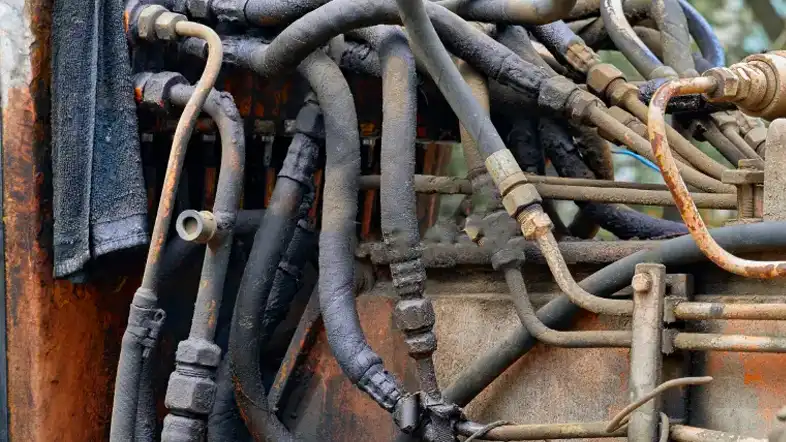
Responsible hydraulic hose disposal brings about a range of significant benefits that extend beyond immediate environmental concerns. Adopting practices that prioritize the proper disposal of hydraulic hoses contributes to sustainability, regulatory compliance, and a positive corporate image. Here are some key benefits of responsible hydraulic hose disposal:
Environmental Conservation:
The foremost benefit lies in environmental conservation. Responsible disposal prevents the contamination of soil and water sources, safeguarding ecosystems and preventing harm to wildlife. This contributes to the overall preservation of the environment and biodiversity.
Regulatory Compliance:
Responsible disposal practices ensure compliance with environmental regulations and standards. Adhering to these regulations not only avoids legal repercussions but also reflects a commitment to ethical and sustainable business practices.
Reduced Environmental Impact:
By properly disposing of hydraulic hoses, the overall environmental impact is significantly reduced. This includes minimizing pollution, conserving natural resources, and mitigating the ecological footprint associated with the production and disposal of industrial materials.
Positive Corporate Image:
Companies that prioritize responsible hydraulic hose disposal enhance their corporate image. Consumers and stakeholders increasingly value environmentally conscious practices, and businesses that demonstrate a commitment to sustainability are likely to be viewed favorably.
Long-Term Cost Savings:
While initial investment in responsible disposal practices may incur costs, the long-term benefits translate into cost savings. Avoiding potential fines from regulatory non-compliance, reducing waste management expenses, and improving efficiency contribute to overall financial savings.
Brand Reputation and Trust:
Responsible hydraulic hose disposal contributes to building a positive brand reputation. Consumers and partners are more likely to trust and engage with businesses that demonstrate environmental responsibility, fostering long-term relationships and attracting a loyal customer base.
Community Engagement:
Responsible disposal practices also engage the local community positively. Demonstrating commitment to environmental stewardship can lead to community support and involvement. This can be particularly significant in industries where community relations play a vital role.
Employee Morale and Productivity:
Employees tend to take pride in working for companies that prioritize sustainability. Responsible hydraulic hose disposal contributes to a positive workplace culture, boosting employee morale and potentially enhancing overall productivity.
Innovation and Adaptability:
Embracing responsible disposal practices encourages innovation in waste management and recycling technologies. Companies that lead in adopting these innovations demonstrate adaptability and position themselves as industry leaders in environmental sustainability.
Global Sustainability Goals:
Responsible hydraulic hose disposal aligns with global sustainability goals. By contributing to a circular economy and reducing environmental impact, companies actively participate in broader initiatives aimed at creating a more sustainable and resilient future.
How Do You Dispose of Hydraulic Fluid
Hydraulic fluid disposal requires careful handling due to its potential environmental and health impacts. Here’s how to dispose of the waste hydraulic fluids properly:
1. Collect and Store:
- Collect: Drain the hydraulic fluid into a clean, leak-proof container specifically designed for used oil.
- Store: Keep the container tightly sealed and away from heat sources.
2. Find a Proper Disposal Site:
- Local Recycling Centers: Many communities have designated recycling centers that accept used oil, including hydraulic fluid.
- Auto Parts Stores: Some auto parts stores offer used oil collection programs.
- Licensed Hazardous Waste Facilities: For larger quantities or specific types of hydraulic fluids, contact a licensed hazardous waste disposal facility.
3. Never:
- Pour down the drain: This is illegal and severely pollutes waterways.
- Dump on the ground: This contaminates soil and groundwater.
- Burn the fluid: Burning creates harmful fumes and air pollution.
Important Notes:
- Check Local Regulations: Disposal regulations vary by location. Contact your local waste management agency for specific guidelines and approved disposal sites in your area.
- Wear Protective Gear: When handling used hydraulic fluid, wear appropriate personal protective equipment, such as gloves and safety glasses.
- Proper Labeling: Clearly label the container as “Used Hydraulic Fluid.”
By following these guidelines, you can ensure the safe and responsible disposal of hydraulic fluid, protecting the environment and complying with local regulations.
Conclusion
In conclusion, the proper disposal of hydraulic hoses is a critical aspect of environmental conservation. As industries and individuals recognize the impact of their actions, responsible disposal practices will become the norm. It is our collective responsibility to ensure the sustainability of our planet by embracing eco-friendly alternatives and fostering a culture of environmental stewardship.
Hydraulic Hose Disposal FAQs
Why is hydraulic hose disposal important?
Proper disposal prevents environmental contamination and promotes sustainability.
What are the environmental risks of improper disposal?
Improper disposal can lead to soil and water pollution, harming ecosystems and wildlife.
Are there any regulations regarding hydraulic hose disposal?
Regulations exist to guide proper disposal, emphasizing environmental responsibility.
How can individuals contribute to responsible disposal?
Individuals can educate others, choose environmentally friendly products, and support eco-friendly initiatives.
What innovations are being explored in hydraulic hose recycling?
Emerging technologies aim to overcome recycling challenges, providing sustainable solutions for hydraulic hose disposal.

